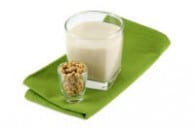Boosting Calcium for Pregnant Women
Your calcium needs double during pregnancy, so that your body can build healthy baby bones and maintain mommy’s healthy frame.
Baby’s teeth and bones begin to form in the second month, and double their growth by the sixth. If the calcium in your diet is insufficient, baby will pull calcium from your bones, making them more brittle — a condition called osteoporosis. You and your baby together need an average of 1,600 milligrams of daily calcium, 800 milligrams more than before you were pregnant. Be sure your calcium reserves are adequate when your baby begins to need large amounts, which is primarily during the third trimester.
Unless you must avoid dairy products, it’s not too difficult to ingest this amount. New studies show that pregnant women who took 1,500 to 2,000 milligrams of daily calcium supplements can reduce their chances of developing high blood pressure and pre-eclampsia by 60-70 percent. One quart of milk contains your total daily requirement for calcium for pregnant women.
The Foods to Look For
The champion food that contains high amounts of calcium for pregnant women, the food that packs the most calcium into the least calories is yogurt.
If you dislike milk, an equivalent amount of yogurt is higher in calcium and generally more nutritious than milk anyway. Treat yourself to a daily yogurt shake. Three 8-ounce cups of yogurt will meet the total daily needs of calcium for pregnant women. Cheese is also a concentrated source of calcium that is an alternative to drinking milk. If you have trouble digesting regular milk, try acidophilus milk.
If you have a lactose intolerance, try calcium-enriched soy or rice milk or take the enzyme lactase (lact-aid), available in tablet form, along with your milk. If it’s the fat or the calories in dairy products that you’re not fond of, try low-fat or non-fat dairy products, which may contain slightly higher amounts of calcium.
Best sources of calcium include yogurt, milk, salmon (if the salmon is canned, make sure it includes the softened bones as they hold a lot of calcium), tuna, sardines, cheese, tofu, cottage cheese, blackstrap molasses, kale and refried beans.

